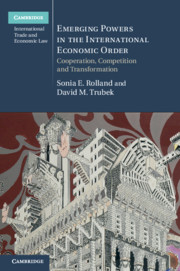Book contents
- Emerging Powers in the International Economic Order
- Cambridge International Trade and Economic Law
- Emerging Powers in the International Economic Order
- Copyright page
- Contents
- Tables
- Preface
- Table of Treaties and Conventions
- Table of Cases
- WTO Cases
- Abbreviations
- 1 Introduction
- 2 Cooperation Narratives and Theoretical Divergences
- 3 Developing Countries’ Love–Hate Relationship with Neoliberalism
- 4 Seeking a New Balance of Rights and Obligations in International Investment Law
- 5 Emerging Economies, Developmental Strategies and Trade Standards: the Search for Alternative Space
- 6 Emerging Economies and the Future of the Global Trade and Investment Regime
- Bibliography
- Government Sources
- Index
2 - Cooperation Narratives and Theoretical Divergences
Published online by Cambridge University Press: 22 July 2019
- Emerging Powers in the International Economic Order
- Cambridge International Trade and Economic Law
- Emerging Powers in the International Economic Order
- Copyright page
- Contents
- Tables
- Preface
- Table of Treaties and Conventions
- Table of Cases
- WTO Cases
- Abbreviations
- 1 Introduction
- 2 Cooperation Narratives and Theoretical Divergences
- 3 Developing Countries’ Love–Hate Relationship with Neoliberalism
- 4 Seeking a New Balance of Rights and Obligations in International Investment Law
- 5 Emerging Economies, Developmental Strategies and Trade Standards: the Search for Alternative Space
- 6 Emerging Economies and the Future of the Global Trade and Investment Regime
- Bibliography
- Government Sources
- Index
Summary
This chapter focuses on the discourse emanating from developing countries regarding international economic law, particularly as it relates to liberalization and development. It highlights tensions between narratives of cooperation among developing countries and domestic realities of diverging interests and priorities. With respect to cooperation, the larger, middle-income countries and some regional groupings emphasize mutual respect for sovereignty and domestic political economy choices. Investment relations among them are ostensibly in support of domestically designed developmental projects and needs. South–South trade groups seek to unlock regional potential free from the political constraints that often accompany North–South trade relations. However, a closer consideration of the domestic discourse and political economy models of Brazil, China, India and African countries (in the context of regional groupings such as SADC- and African Union-sponsored initiatives) denotes significant divergences in objectives for trade and investment relations, as well as in the degree and means of economic liberalization.
- Type
- Chapter
- Information
- Emerging Powers in the International Economic OrderCooperation, Competition and Transformation, pp. 17 - 33Publisher: Cambridge University PressPrint publication year: 2019

